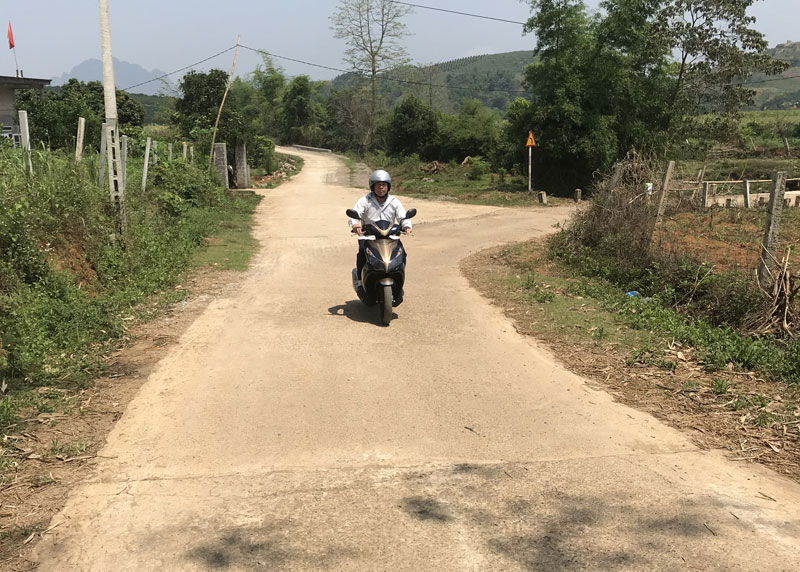
(HBO) – Dong Phong commune in Cao Phong district, the northern mountainous province of Hoa Binh, has emerged from a commune facing various difficulties to become locality completing 19 criteria set for a new-style rural area.

Residents of Quang Ngoai hamlet, Dong
Phong commune, Cao Phong district, donate more than 6,000 sq.m of residential
and production land to build rural roads and infrastructure facilities.
During the implementation of the
resolution of the 28th congress of the communal Party Committee, Dong Phong has
encouraged locals to contribute nearly 1,300 workdays. A total of 268
households have donated over 8,000 sq.m of land, along with many assets and
constructional materials, to build roads and infrastructure facilities. The
most outstanding contributors are from Chang Trong, Chang Ngoai, Quang Trong
and Quang Ngoai hamlets.
Bui Van Doan, Secretary of the Party
Organisation of Quang Ngoai hamlet, said more than 50 households in the hamlet
have donated 6,000 sq.m of residential and production land to build roads and
other infrastructure facilities.
The construction and land donation have
been publicised by the communal authorities and the hamlet’s management board
under the supervision of the people’s inspection board.
This method helps raise public trust in
the Party leadership, while helping improve the awareness and the sense of responsibility
of each individual for new-style rural area building.
Locals have directly contributed opinions
to the construction plan. Over the past seven years, they have contributed 10
billion VND worth in cash and worth of workday, land, property and construction
materials, or 17.6 percent of the total cost of the construction.
Thanks to the joint efforts, Dong Phong
commune has been given a facelift. Over 77 percent of roads connecting villages
in the commune have been concretised and more than 83 percent of canals have
been consolidated. All households in the commune have accessed regular and safe
power lines. Two thirds of schools in the commune have satisfied set standards.
All hamlets and villages have cultural houses. The communal medical centre has
been qualified and more than 95 percent of local residents have participated in
health insurance. The number of poor households dropped by 10.6 percent as
compared with 2011 and the average income per capita hits 26 million VND
annually (up 10.1 million VND against 2011).
The upgraded infrastructure system has
contributed to spurring local socio-economic development, especially the shift
of crop structure. Currently, the commune has 118 ha of citrus trees of
high-economic values./.
Following the direction of the Vietnam Women's Union (VWU) Central Committee, the Hoa Binh provincial Women's Union has proactively and extensively implemented the "Godmother" programme with various practical and creative solutions to support and care for children who become orphans due to the COVID-19 pandemic and other causes. As many as 448 children have received both material and spiritual assistance in the 2021–2025 period.
More than just an information technology teacher, Bui Van Nien is an inspiring figure who has nurtured the scientific curiosity and creative spirit of students in Vietnam’s ethnic minority communities.
Da Bac is the most disadvantaged mountainous district in Hoa Binh province, with ethnic minorities accounting for about 90% of its population. Over the past years, the district has mobilised resources to implement ethnic policies to improve the quality of life of local people.
In recent years, Hoa Binh province has consistently prioritised the protection, care, and education of children, particularly those from ethnic minorities and disadvantaged backgrounds, by creating a safe, healthy, and nurturing environment for their all-round development.
The Steering Committee for Tobacco Harm Prevention and Control of Hoa Binh province, in coordination with the Tobacco Harm Prevention and Control Fund, held a ceremony on May 28 in response to the World No Tobacco Day (May 31) and the National No Tobacco Week (from May 25 to 31). The event was chaired by Nguyen Van Toan, Standing Vice Chairman of the provincial People’s Committee and head of the Steering Committee.
Since 2021, the Center for Industrial Promotion and Industrial Development Consulting (CIIDC) under the Department of Industry and Trade has been implementing a school lighting model as part of the plan for using energy efficiently and economically in Hoa Binh Province in the pẻiod of 2021 - 2025. This model not only aims to improve the learning conditions and enhance the education quality, but it also promotes the message of energy saving, energy security, environmental protection and contributes to the goals of socio-economic development.



